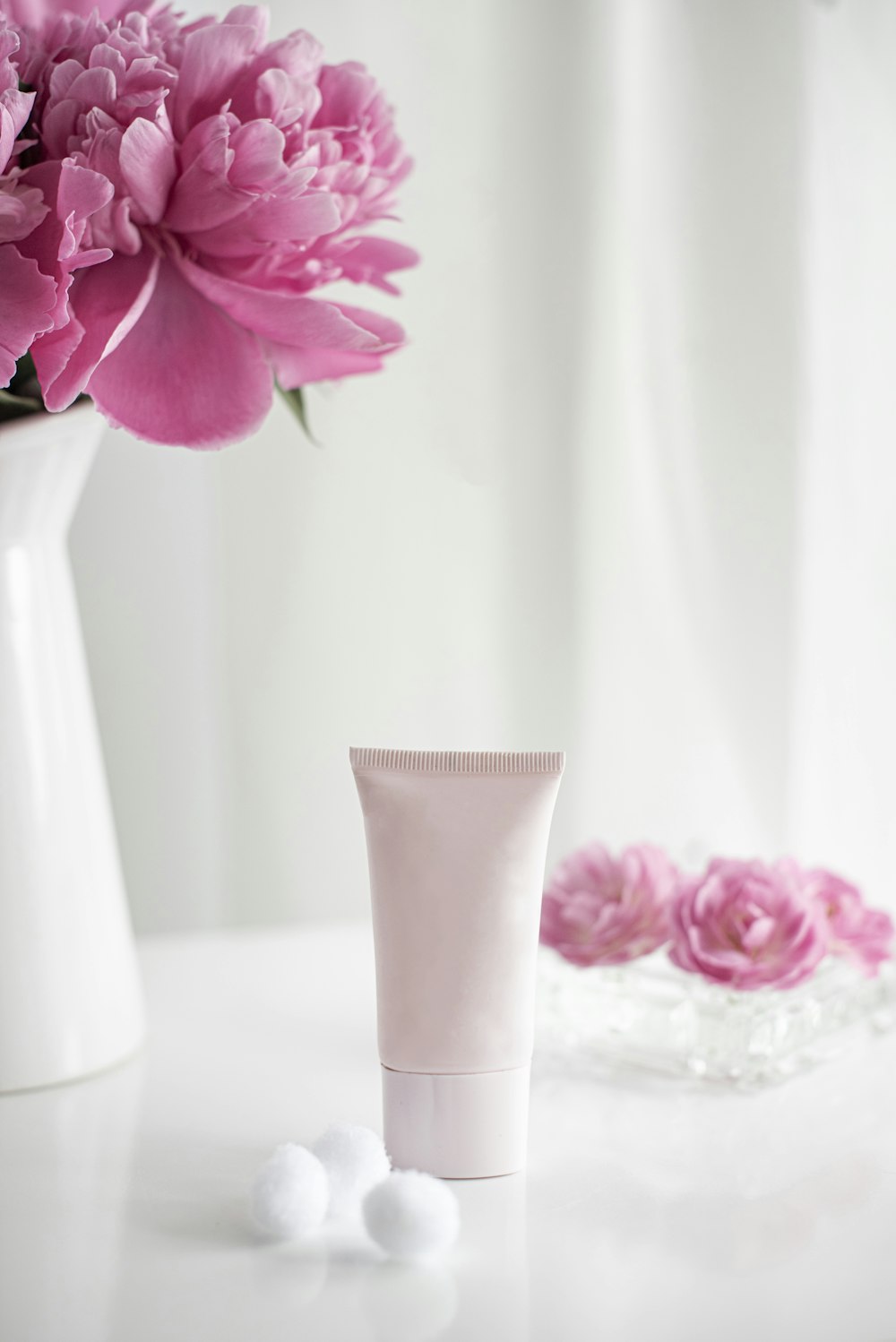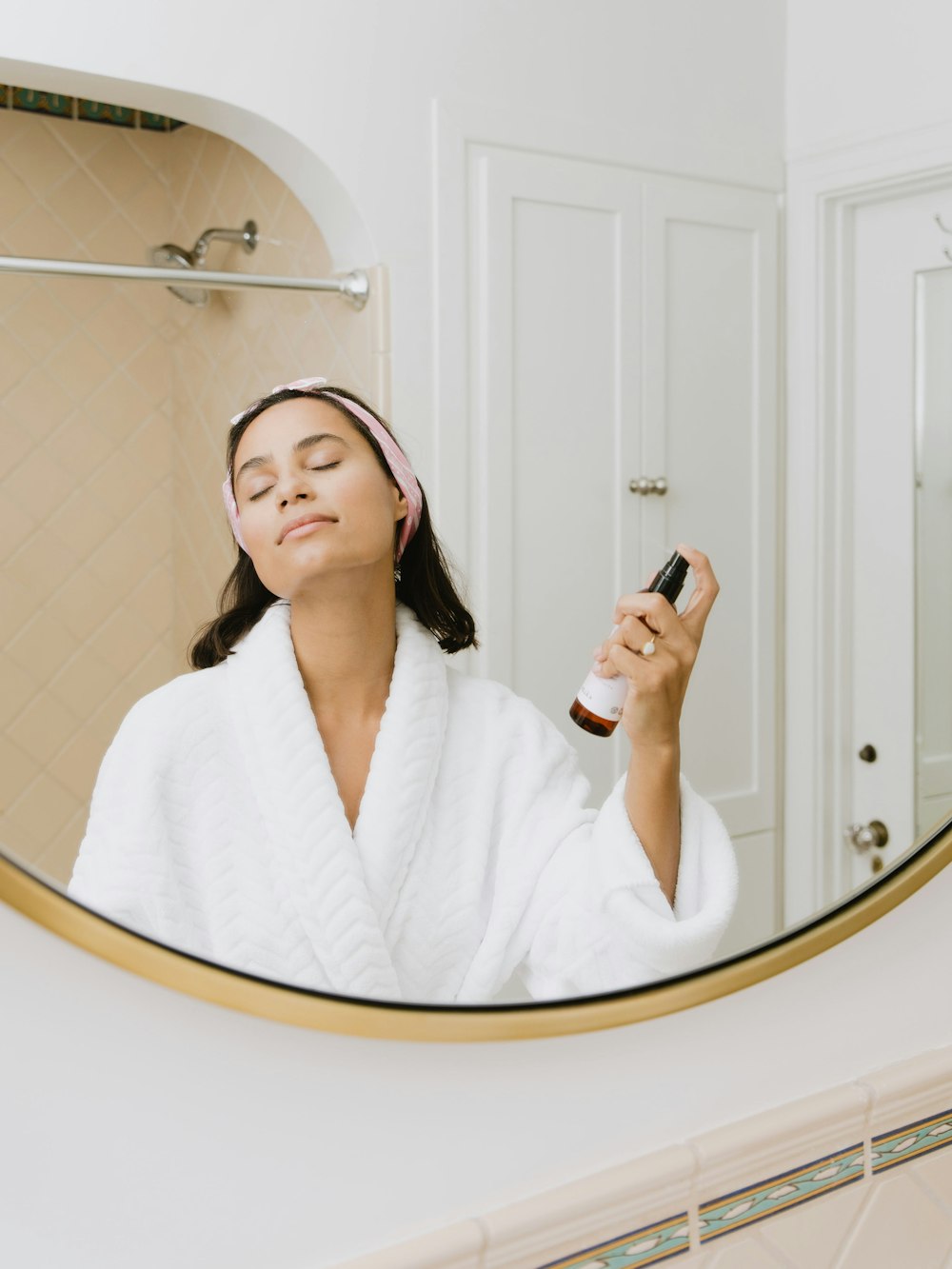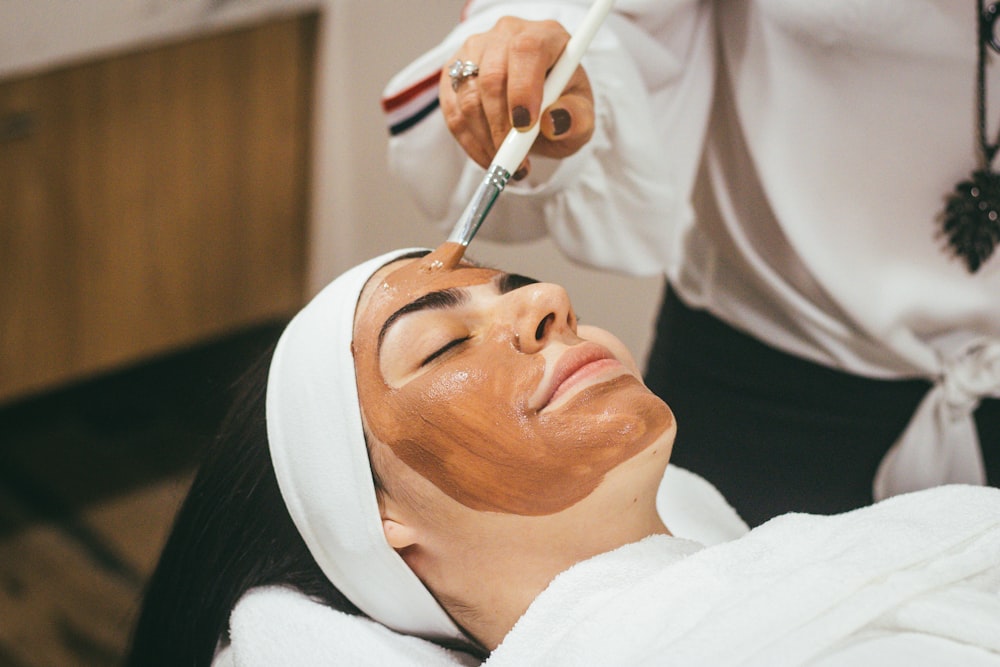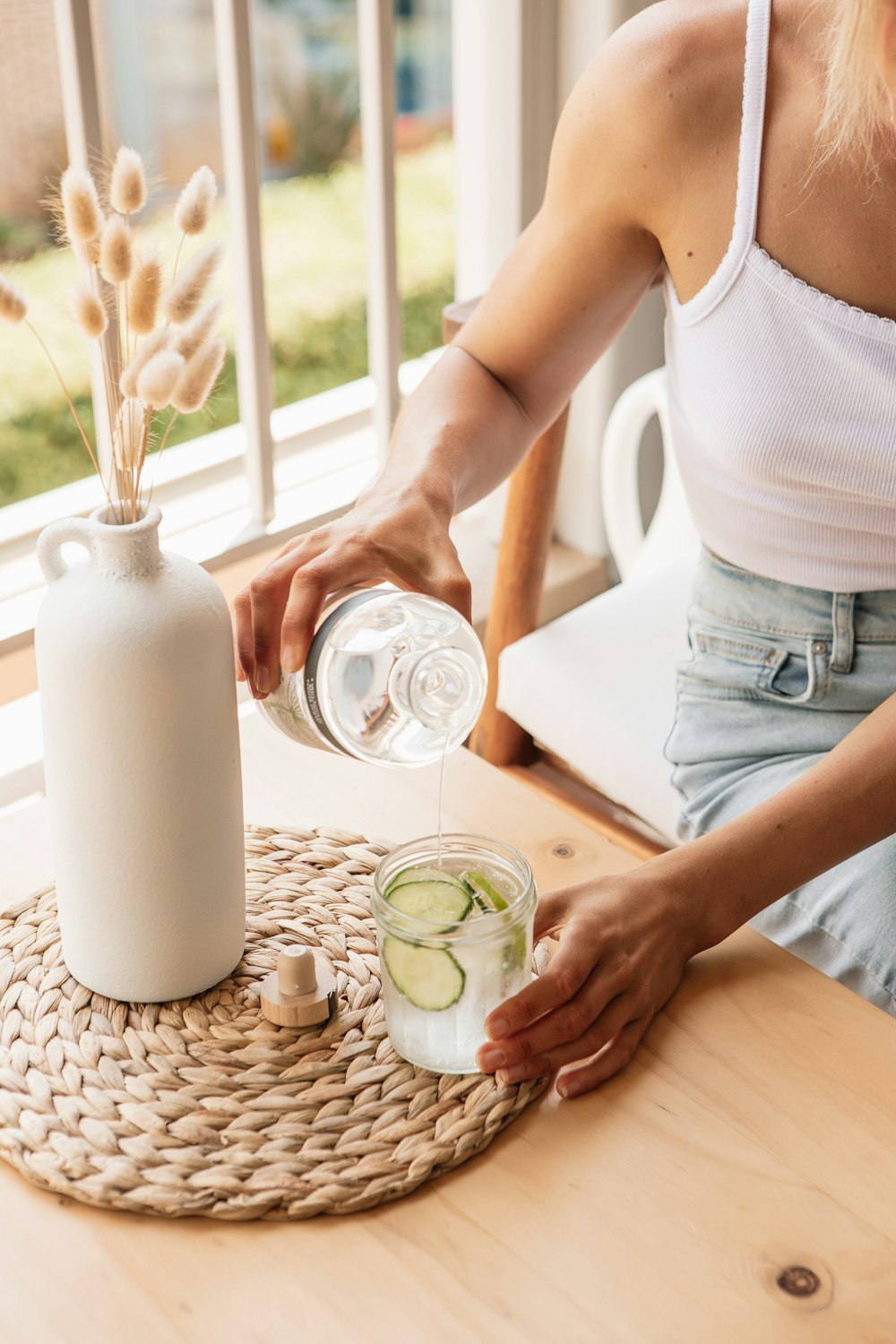
As the most external part of our bodies, the skin is frequently exposed to the environment, which is in constant contact with pollutants, allergens, and everything else that can damage it.
Not only does invasion come from external factors, but it can also be internal: cigarette smoke, stress, and an unhealthy diet can all reduce your skin’s barrier and make it become dry, irritated, and more prone to ageing.
Luckily, there are so many ways in which you can prevent skin from getting old and damaged and take care of it to have young, elastic, and glooming skin.
1. Cleanse, nurture, moisturize
Cleanse your skin daily
The first basic rule to take care of your skin is to cleanse it regularly. Your skin is exposed to a myriad of germs, toxins, and external substances that can damage and irritate it. Stress and lack of sleep can be toxic, too, affecting the appearance and texture of your skin.
It’s essential to cleanse your skin from toxins, makeup, and dead skin on a daily basis. To cleanse your skin, apply a face washer once or twice per day. Please choose a product with a gentle formula because harsh products can damage your skin by breaking down its outer layer.
Nurture your skin using a facial serum
After cleansing, you can apply a serum whose aim is to nurture the skin. Its specific active ingredients, such as vitamin C or retinol (scroll below to know more), are perfect for your skin’s health.
Serum provides the skin with nurturing substances and water; thus, it’s ideal for preventing pigmentation and wrinkles. If you have a very sensitive skin, always try new products in small amounts before applying them because serum products can be pretty aggressive since some are relatively concentrated.
Moisturize!
The last step of your daily skincare process is to moisturize, that is, to hydrate and strengthen your skin. Moisturizers can act as a shield, protecting the skin from outside aggressors.
Use them once or twice a day to prevent or treat dry skin. Dry skin can be a problem because it lowers your skin barriers and can lead to itching, flaking, and peeling, or even eczema. A good moisturizer should contain:
- humectant to improve the skin’s moisture (e.g., hyaluronic acid).
- emollient substances (oils and butter, such as shea butter).
- ceramides to hold skin cells together.
- occlusive substances (like cocoa butter or beeswax) to create a barrier and prevent moisture loss.
It’s essential to know what your skin type is so you can choose the best moisturizer for you. If you have dry skin, choose richer creams and lotions. If your skin is oily or you tend to acne, prefer a lighter gel.
Basic rules for your skincare routine
Remember these few simple rules for your daily skincare routine:
- Cleanse your face once or twice a day (in the morning and before going to sleep, for example). Washing it too frequently can be counterproductive.
- If you wash your face, avoid soaps or detergents, which can remove the outer layer of skin. This layer is made up of good bacteria and essential oils and is necessary to protect your skin.
- Wash your face with warm water. Warm water can remove good bacteria and essential oils, while cold water might leave dirt and traces of makeup on your skin.
- When it’s time to remove your makeup, be sure to use gentle products such as micellar water or oil-free liquid solutions.
- Don’t touch your skin, and don’t remove pimples or scratches.
- Keep your makeup tools clean.
Before applying a new product, try it on a small area of your skin. Apply it on a discrete area (such as your wrist) and wait 48 hours to see if any allergic reaction occurs. Allergic reactions include itchiness or small bumps: if you have these symptoms, don’t use that product and try another one.
2. Use sunscreen
Cleansing and moisturizing is an essential step for having bulletproof skin, but what comes next? One of the most dangerous aggressors for our skin is sunlight. In fact, the sun is one of the primary causes of our skin’s premature ageing, and excessive unprotected exposure to the sun’s ultraviolet (UV) rays can lead to sunburn and even skin cancer.
There are two different kinds of UV radiation that can hurt your skin. UVB rays are the leading cause of sunburn, while both UVA and UVB can increase the risk of developing skin cancer. To minimize exposure to dangerous UV rays, avoid exposure to the sun between 11 am and 3 pm (when the UV intensity is stronger).
Said so, it’s almost intuitive that sunscreen shouldn’t be a summer season’s prerogative, but you need to use it whenever you expose yourself to sunlight if you want to prevent UV rays damage.
How to choose a good sunscreen? First of all, you should look for a good SPF (30 or higher). The SPF indicates how good that cream is to protect you from the sun. A good sunscreen must be waterproof so that it can resist water and sweat. Finally, it would be best if you looked for broad-spectrum creams, which are able to protect you from all types of UV rays: UVA and UVB include zinc oxide or titanium dioxide and have a degree of protection 30 or higher.
When to exactly put on your sunscreen? It should be the last step after cleansing and moisturizing your skin and right before any makeup.
3. Apply skincare products
Skincare products, such as body lotions, can noticeably improve your skin’s texture and appearance. It is important to choose a cream with nurturing ingredients (shea butter or aloe, for example). You can apply body lotion after having a shower and couple it with a gentle skin massage to improve blood circulation and increase relaxation.
4. Take care of your hands
Hands are one of the parts of our body we use the most. We might not be aware of it, but most of the time, we wash them quite often, apply harsh antimicrobial gels, wash the dishes, and clean the house with strong chemical products. But all these activities can lower the skin’s barrier and make our hands dry and weaker. That’s why it’s essential to take care of our hands by applying a nurturing and emollient hand cream.
There’s no exact rule as to how often you should use hand cream. In general, applying it every time you feel your hands dry is a good solution. Most of all, try not to use or wash your hands for at least 30 minutes after you’ve applied the cream – otherwise, it won’t have any effect. Applying a good emollient hand cream before going to sleep is a good way to give your hands the time to absorb it.
5. Get a face scrub
Scrubbing is a treatment to exfoliate the skin to remove its outermost layer and dead skin cells. It consists of applying a proper cream on the interested zone and massaging with gentle but firm movements. By doing a regular scrub, you can help your skin look more elastic and radiant.
There are several different types of scrubs; some of them are based on the abrasive action of its component (the so-called physical exfoliants), while others – known as chemical exfoliants – contain certain ingredients that perform the scrubbing action (for example, lactic acid, glycolic acid). Chemical exfoliants are the most effective, while physical exfoliants have a quicker action but are quite aggressive, so you should use them with moderation.
You need to know what your skin type is to choose the right scrub that works for you. Generally speaking, if you have sensitive, dry, or acne-prone skin, look for gentle face scrubs with almost no abrasive action. You can pick creamy face scrubs with ingredients like green tea or salicylic acid. If you have an oily skin, you can use gel-based formulations with a bit of foaming effect.
Your skin type and condition also determines how often you should do a scrub. You can do it around three times per week if you have oily skin. In other cases, you should do face scrubs less frequently. People with normal skin can scrub twice a week, while if you have sensitive or acne-prone skin, don’t use exfoliants more than once a week. In any case, always try the product on small parts of the body before using it.
You can also apply a homemade scrub made with simple ingredients like oatmeal, sugar, honey, rice powder, and coconut oil. And if you’re a DIY freak, try these recipes to make your own scrub at home.
Last but not least, use only one exfoliant (don’t mix two or more products). Our skin is very sensitive, and a combination of different ingredients can damage it instead of soothing it.
6. Have a healthy diet
Everyone interested in well-being knows that our diet has a significant impact on our whole health, so it’s not surprising to know that having a balanced diet is essential to have gloomy, healthy, and elastic skin. But what nutrients do you need, and what should you avoid to bulletproof your skin?
Get your fill of antioxidants.
Antioxidants protect the skin because they lower the production of free radicals, generating a phenomenon called oxidative stress. Such phenomenon is responsible for ageing and plays a major role in chronic and degenerative diseases such as cardiovascular disease, arthritis, and cancer. Besides being so toxic for the body, free radicals can damage the skin and speed up the formation of wrinkles.
Our bodies produce free radicals as a byproduct of metabolism, but they can also come from outside factors like UV rays, pollution, and cigarette smoke. Therefore, it is essential to use sunscreen, avoid unhealthy habits like smoking, and increase your antioxidant intake, since they can help you recover from oxidative stress.

To do so, eat rich in antioxidants such as dark, leafy greens, dark chocolate, berries, and dried fruits (like walnuts and pecan). Daily ingestion of antioxidants can prevent ageing, relieve skin inflammation, and reduce sunspots. Additionally, antioxidants hydrate the skin and increase its moisture. Some of them, such as vitamin C, can also foster the production of collagen – which is one of the most essential molecules for your skin’s health.
Meet your daily intake of healthy fats
It’s crucial to have an adequate daily intake of healthy fats because they’re essential in your diet, and healthy fats play a crucial role in skincare as well because they are the primary component of cell membranes. A diet rich in healthy fats makes your cell membranes stronger and healthier, protecting your skin against damages caused by external aggressors. When your healthy fats intake is too low, your skin becomes dry and more prone to inflammation.
Omega-3 and omega-6 are among the healthiest fats you can introduce to your diet. The best sources of omega 3 and omega 6 are nuts, flax and chia seeds, salmon, avocado, and olive oil.
Banish processed food!
If you want to have young and glooming skin, you should avoid processed food, often loaded with unnecessary sugar. Besides increasing the inflammation in your body, those sugars can promote the degradation of collagen and lead to a loss of elasticity. As a consequence, the skin tends to age faster, and wrinkles appear.
Drink lots of water
Fulfilling your water intake is necessary to improve your skin’s health and appearance. If you drink enough water, your skin keeps moisturized and glowing.
General guidelines say to drink around eight glasses per day; however, there’s no general rule, and the amount of water you need depends on your body’s needs – as well as on what you’re doing. If you’re just come out from a workout session in the gym, you might need more water than if you’ve been working on your laptop.
7. Use collagen supplements
Collagen is the most plentiful kind of protein found in our bodies and makes up our connective tissues, contributing to making our skin look bright and young. With ageing, our natural reserves of this protein decrease, and our bodies produce far less collagen. A deficiency in our collagen reserves can lead to saggy skin and wrinkles.
That’s where collagen supplements come to help: they contain predigested collagen, which is much easier to absorb than the one you introduce with diet. In fact, collagen is a huge molecule, and it is difficult to digest it.

Our Kolla Code Collagen is designed to increase collagen protein levels in your skin to help reduce wrinkles and reverse the appearance of ageing. Its main ingredients are Vitamin C and E from natural sources, and its formula uses products that have been used for hundreds to thousands of years in Asia. By using Kolla Code Collagen, you can help yourself maintain a youthful and healthy-looking skin and get strong nails and fuller hair.
8. Take care of your gut
The gut is a highly complex system and has a significant impact on your whole health. A bad-functioning gut can influence everything in your body, from your weight to your mental health. And it’s needless to add that it can also damage your skin.
The connection between your gut and your skin has even a name: the gut-skin axis. Its working mechanism is quite complex and intricate; however, what you need to know is that manifestations on the skin can accompany gastrointestinal disorders, and imbalances in the gut microbiome can lead to acne, eczema, and psoriasis.
Taking care of your gut is therefore essential if you want to maintain young and healthy skin. Anything that can damage your gut – cigarette smoke, stress, processed food, sugar – will damage your skin as well. Also, emotional states like depression or anxiety can act on the microbiota in your gut and increase inflammation.
There isn’t a unique way to take care of your gut, and becoming aware of what’s harmful to your gut needs time: not everyone has the same reactions to food. There are, however, some foods that can irritate most people’s gut (such as coffee, alcohol, fried food, and sugars). Suppose you eat lots of sugars, for example. In that case, you can experience constant intestinal irritation as the sugar attacks the healthy bacteria in your gut and increases the pathogenic bacteria (in other words, the harmful bacteria).
In all other cases, starting a journal might help you figure out your reactions when you eat particular food (like gluten, dairy, soy, or other food that can irritate your gut). Once you know what food can sabotage your gut, the next step is to eliminate it from your diet.
Sometimes, cutting off the food isn’t enough to restore your gut’s health. You might need to eat food that supports it, such as fermented food (like sauerkraut and kefir), fibre, and, above all, probiotics – an excellent source of good bacteria.

Our Total Gut Solution is a probiotic designed to support and improve your digestion, maintain a healthy weight, improve your cell growth, and strengthen your immune system. Total Gut Solution contains three of the most important bacteria strains present in your gut (Bacillus subtilus, Probiotic Bacterial, and Lactobacillus Rhamnosus). Thanks to its formulation, Total Gut Solution supports a healthy digestive system so you can experience proper bowel movement, appetite reduction, and natural weight loss.
9. Use retinol
Retinol is one of the best allies for healthy and beautiful skin. It helps repair damages provoked by the sun and protects your skin against cancer.
Retinol is a molecule that is derived from vitamin A, an essential micronutrient that isn’t naturally produced in the body, so we need to introduce it through diet or supplements. It’s important to point out that retinol is just one of the many retinoids, a family including all vitamin A derivatives, like retinoic acid, retinaldehyde, or retinyl esters. Consider this the next time you’ll get confused thinking about whether you need to buy retinol or retinoid.
Several retinol-based formulations are available over-the-counter (OTC) or with prescription. In general, OTC formulations have fewer percentages of retinol, but they work quite well because even small concentrations of retinol can benefit your skin. To start, you can try retinol-based serum to apply after you cleanse your skin and before moisturizing.
10. Reduce stress
Repetitive or chronic stress can have a serious effect on your skin and trigger several diseases, including psoriasis and eczema. That’s why you need to consider reducing your stress levels if you want to take care of your skin.
You can do proper relaxation techniques (e.g., breathing techniques), try meditation or yoga, and improve your night sleep. Targeted treatments for your skin include massage – what’s better than a gentle, soothing touch to let go of your tension and experience a blissful sense of relaxation?
Massage techniques span from doing a home massage after your shower to go to a professional massage center. Today, I want to give you a few tips about how to take care of your face with a good facial massage.
Get a facial massage
A nicely done facial massage can lessen the tension in your face muscles, improve circulation and lymphatic drainage, and keep your skin healthy and elastic. Everyone can do a facial massage, and it takes only a few minutes a day. If you’ve never done it before, don’t wait any longer and give it a try!
There are a lot of techniques to do a DIY face massage; here’s one of my favourites:
- Start with your forehead and massage the skin bottom up with your fingertips.
- Pick your eyebrows with small but firm movements.
- Gently massage your eyes.
- Massage your cheeks with circular movements.
- Stretch the skin around your jaw with your fingertips.
- Massage your neck using circular fingertip movements.
When doing a face massage, keep in mind to:
- Carefully clean your face and hands before doing the massage (otherwise, you risk spreading all the impurities and dirt over your face), and make sure your fingernails are short.
- Apply the massage with warm hands, gentle but firm pressure, and continuous contact.
- Don’t drag your finger across the skin but instead, let them flow smoothly.
- Wet the tips of your fingers with oil or serum.
11. Go to a dermatologist if you have a specific problem or skin disease
The strategies listed in the article are more or less everything you need to do if you want to maintain healthy and young skin. However, if you experience any skin problem that doesn’t go away with time or notice something unusual, you should consult a specialist. Dermatologists are skin doctors and can help you figure out why you have a specific problem and how to address it.












